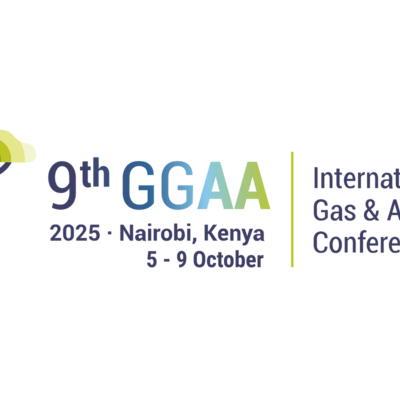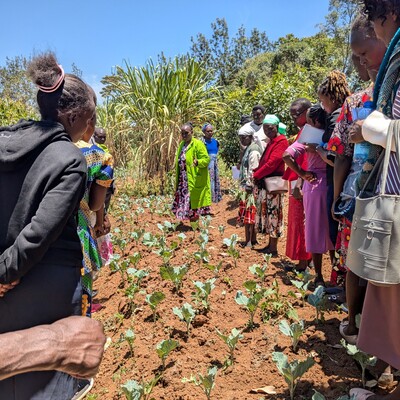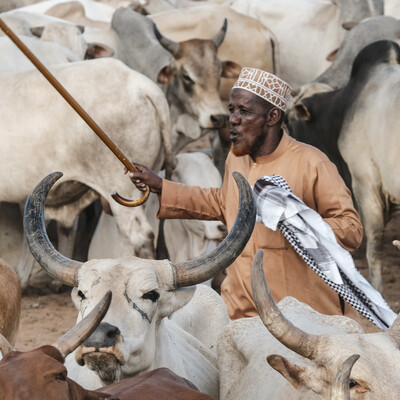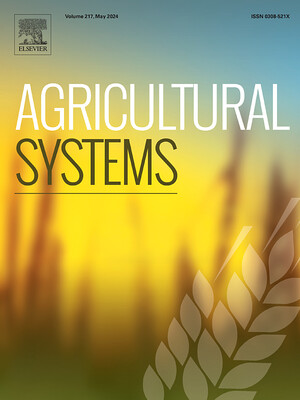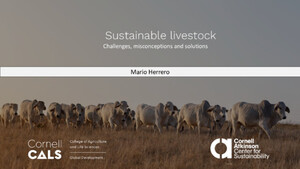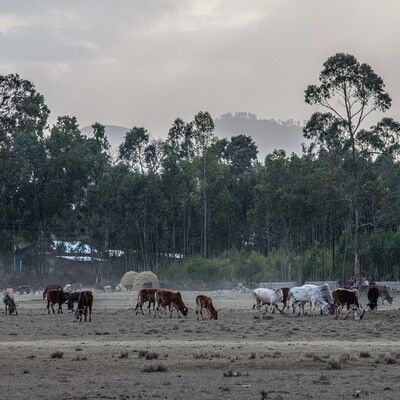
Climate Change Knowledge Exchange: Great conversations, good learning, but one step missing for transformation and action?
The Institute for Development Studies (IDS) hosted a ‘Climate Change Knowledge Exchange‘ on 5-6 March 2013. The exchange which was designed with the intention of being ‘an antidote to death by Powerpoint‘, was co-created on the Climate Change and Social Learning (CCSL) sandbox – which was set up by ILRI and the CGIAR Research Program on Climate Change, Agriculture and Food Security (CCAFS) in 2012, as recently explained on this space.
Social learning featured highly on the agenda of this event from the start, thanks to the inputs of various sandbox members including the sandbox facilitation team – which was invited to co-facilitate the Knowledge Exchange – including Ewen le Borgne from ILRI’s Knowledge Management and Information Services.
A group of about 70 participants engaged in the event with the intention to learn, share, reflect and act, in various plenary sessions and working group slots around the four main strands of the event:
- Whose knowledge counts? Locally-held knowledge for climate change adaptation (convened under the auspices of IDS and the CCAFS Climate Change Social Learning Sandbox)
- Brokers, translators and intermediaries: new roles and challenges for putting knowledge into practice (convened by the International Development Research Centre of Canada and IDS)
- How to learn from climate change evaluations in and between organizations (convened by the Climate and Development Knowledge Network (CDKN), the Evaluation Office of the Global Environment Facility [GEF-EO] and IDS)
- Extreme events and disaster risk reduction (convened by IDS)
Two loops of learning
With intellectual and financial sponsorship of the CCSL initiative, the idea of the organizing team was to turn this Exchange into an exciting opportunity to undertake an experience through three learning loops. The table below – adapted from CCSL sandbox work – served as a basis to explain some of the differences between the three loops of learning.
First loop | Double loop | Triple loop | |
| Nature | Instrumental | Communicative | Transformative |
| Use of knowledge | Acquiring new knowledge | Understanding / reinterpreting knowledge | Examining assumptions behind (particularly dominant) knowledge |
| Focus (also temporal) | Efficiency (now) | Effectiveness (next) | Dynamic relevance (over time) / adaptive capacity |
| Key questions | What are we doing now and how can we improve this? WHAT IS | What could we do to improve the pursuit of our aims? WHAT COULD BE | What should we do to improve the way we think about improving our approach? WHAT SHOULD BE |
| Approach followed | Static, unilateral information flows e.g. dissemination of case studies etc. | Participatory communication, bilateral knowledge flows | Dynamic experience building, multilateral knowledge flows |
Each of the conversation strands explored what is currently going on (experiences and results), what could be (ideas to bring people together and solve issues) and what should be (through a transformative process). The Exchange indeed allowed participants to develop rich pictures of the current state of work around intermediaries and knowledge brokers, learning from evaluation, disaster risk reduction and the issues of power that affect climate change initiatives (in the ‘Whose knowledge counts’ strand).
The second group’s work was also very rich and unraveled many good ideas, possible ideals to go forward, based on strong discussions, a thorough exchange of ideas and a joint formulation of possible solutions.
The intermediaries’ group explored the central question of whether knowledge brokers and intermediaries are indeed a role (embodied in a position) or a function, i.e. a set of tasks and responsibilities that can be spread across people and time.
The learning & evaluation group worked around three different topics: how to communicate evaluations in more effective and compelling ways, how to possibly influence policy and policy-making through the results of evaluation and finally how to develop some space for theory-based approaches to evaluation (approaches that explicitly address assumptions and look at a broader context than just one intervention).
The ‘Whose knowledge counts’ and the ‘disaster risk reduction’ groups developed a series of steps to undertake to progressively achieve the ideal vision that they developed after the first session’s back-casting exercise (visioning exercise and working out steps from there to now).
Locally owned knowledge in policy – a future #climatelearn twitter.com/petecranston/s…
— petecranston (@petecranston) March 5, 2013
There was a lot of good learning in this case, but was that really enough to transform participants and lead them to action?
Transformation and action?
In his opening address and in a supporting blog post, Lawrence Haddad, Director of IDS, reminded all participants that it is notoriously hard to learn and act upon that learning. This Exchange was alas no exception. Perhaps the ambitions to bring participants to reflect in totally novel ways were too high, due to the short duration of the event, to the nature of the participants’ group which -not diverse enough- and to the very limited opportunities to combine the two in a joint working experience that could seriously and deeply challenge everyone’s assumptions.
Not much triple-loop learning happened, therefore, although some participant mentioned that it sometimes takes months or even years to realize the effects of being exposed to a conversation – as though learning would go dormant and wake up at a future moment when its fruits are ripe for harvest.
As for action, the ‘marketplace of actions, ideas and commitments‘ suggests that some action will come out of this Exchange. It is certainly the intention of the organizers to review these actions in a few months’ time. However one of the (learning and evaluation) group was also ‘shockingly honest’ in admitting that the ideal picture sketched about influencing policy is fundamentally flawed and doomed.
Shocking honesty #climatelearn ideal evaluation process will never happen. Huge barriers – Political context, donor incentives + many more.
— Tan Copsey (@tancopsey) March 6, 2013
Learning, transformation, action… we might want to think about the transitions between these rather than focus on each of them.
Frances Seballos of IDS reflected on learning about learning. Her blog post should follow shortly and might give additional impressions on the challenges of a complex social process around an event for an even more complex agenda – climate change.
Read more about the Climate Change and Social Learning sandbox





